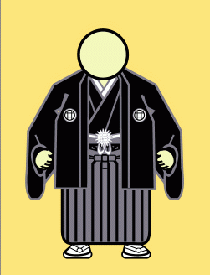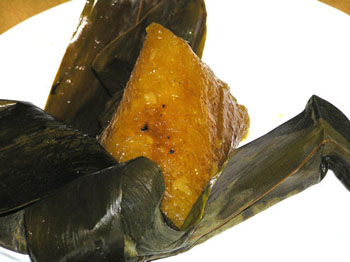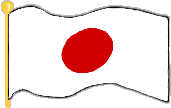背くらべ (Sei-kurabe)
A Japanese Children's Day (Tango-no-Sekku) song...

背くらべ (Sei-kurabe)
Height Comparison
Children's Day Song
Children's Day Song
(Japanese)
(English)
柱のきずは おととしの
五月五日の 背くらべ
粽(ちまき)たべたべ 兄さんが
計ってくれた 背のたけ
きのうくらべりゃ 何(なん)のこと
やっと羽織の 紐(ひも)のたけ
柱に凭(もた)れりゃ すぐ見える
遠いお山も 背くらべ
雲の上まで 顔だして
てんでに背伸(せのび) していても
雪の帽子を ぬいでさえ
一はやっぱり 富士の山
The scratch on the pillar is the marking
Of my height on May 5th two years ago.
My brother marked it while we were eating chimaki*
It's a nice memory of my brother,
So I compared the height yesterday.
I felt so short, barely the height of the strings of my haori**.
I can see mountains when I lean on the pillar.
Remote mountains are also comparing their height,
Each face is up above the clouds.
The highest is Fuji, without the snow cap.
I would like to compare with my brother,
Like that when he comes back home.
Notes
*Chimaki is a kind of rice cake that's eaten on Children's Day (see photo).
**Haori (See photo): "It is a kind of overcoat worn when wearing kimonos (it's not so old a word). It is needed in the winter season or cold-time like this cold season. Sumo wrestlers and women who wear kimonos still wear them. It is worn with a "haori-himo" - a tasseled, woven string fastener for the haori." -Sadao
*****
Author; Atsushi Unno
(海野厚1896 - 1925 )
Composer; Shimpei Nakayama
(中山晋平 1887- 1952)
"Looking at the lyrics, don't you wonder why the time frame was 'two years ago' and not last year?
It is from the author's personal story. Atsushi Unno was born in the Shizuoka Prefecture and had six brothers and sisters. He went to Waseda University, and became a famous children's songwriter. Staying in Tokyo, he made this song with lyrics about the difficulty of returning to his home in Shizuoka (maybe because of his illness). People say he wrote this song from the point of view of his young brother who was 17 years younger than him. Unno died at 28 years old in Tokyo due to tuberculosis." -Sadao

Comments
Pronunciation:
背くらべ (sei-kurabe)
柱の(hasira-no) きずは(kizu-wa) おととしの(ototoshi-no)
五月(gogatsu) 五日の(itsuka-no) 背くらべ(sei-kurabe)
粽(ちまき)(Chimaki) たべたべ(tabetabe) 兄さんが(niisan-ga)
計ってくれた(hakatte-kureta) 背のたけ(sei-no take)
きのう(kinoh) くらべりゃ(kuraberya) 何(なん)のこと(nann-no koto)
やっと(yatto) 羽織の(haori-no) 紐(ひも)のたけ(himo-no take)
柱に(hashira-ni) 凭(もた)れりゃ(motare-rya) すぐ見える(sugu-mieru)
遠い(tooi) お山も(oyama-mo) 背くらべ (sei- kurabe)
雲の(kumo-no) 上まで(ue-made) 顔だして(kao-dashite)
てんでに(tende-ni) 背伸(せのび)(senobi) していても(siteite-mo)
雪の(yuki-no) 帽子を(boushi-wo) ぬいでさえ(nuide-sae)
一は(ichi-wa) やっぱり(yappari) 富士の山(fuji-no yama)


Thanks!
Thanks!
Thanks!
Thanks and Acknowledgements
Many thanks to Sadao Mazuka for sharing this song with us, for translating it and for the midi!
Image: "MontsukiHaoriHakama" by Toto-tarou (Licensed under cc.)
Arigato gozaimasu! 

























